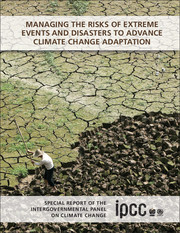 Managing the Risks of Extreme Events and Disasters to Advance Climate Change Adaptation
Managing the Risks of Extreme Events and Disasters to Advance Climate Change Adaptation from Section IV
Published online by Cambridge University Press: 05 August 2012
Abrupt climate change
The nonlinearity of the climate system may lead to abrupt climate change, sometimes called rapid climate change, abrupt events, or even surprises. The term abrupt often refers to time scales faster than the typical time scale of the responsible forcing. However, not all abrupt climate changes need be externally forced. Some changes may be truly unexpected, resulting from a strong, rapidly changing forcing of a nonlinear system.
Adaptation
In human systems, the process of adjustment to actual or expected climate and its effects, in order to moderate harm or exploit beneficial opportunities. In natural systems, the process of adjustment to actual climate and its effects; human intervention may facilitate adjustment to expected climate.
Adaptation assessment
The practice of identifying options to adapt to climate change and evaluating them in terms of criteria such as availability, benefits, costs, effectiveness, efficiency, and feasibility.
Adaptive capacity
The combination of the strengths, attributes, and resources available to an individual, community, society, or organization that can be used to prepare for and undertake actions to reduce adverse impacts, moderate harm, or exploit beneficial opportunities.
Aerosols
A collection of airborne solid or liquid particles, with a typical size between 0.01 and 10 μm, that reside in the atmosphere for at least several hours. Aerosols may be of either natural or anthropogenic origin. Aerosols may influence climate in several ways: directly through scattering and absorbing radiation, and indirectly by acting as cloud condensation nuclei or modifying the optical properties and lifetime of clouds.
To save this book to your Kindle, first ensure no-reply@cambridge.org is added to your Approved Personal Document E-mail List under your Personal Document Settings on the Manage Your Content and Devices page of your Amazon account. Then enter the ‘name’ part of your Kindle email address below. Find out more about saving to your Kindle.
Note you can select to save to either the @free.kindle.com or @kindle.com variations. ‘@free.kindle.com’ emails are free but can only be saved to your device when it is connected to wi-fi. ‘@kindle.com’ emails can be delivered even when you are not connected to wi-fi, but note that service fees apply.
Find out more about the Kindle Personal Document Service.
To save content items to your account, please confirm that you agree to abide by our usage policies. If this is the first time you use this feature, you will be asked to authorise Cambridge Core to connect with your account. Find out more about saving content to Dropbox.
To save content items to your account, please confirm that you agree to abide by our usage policies. If this is the first time you use this feature, you will be asked to authorise Cambridge Core to connect with your account. Find out more about saving content to Google Drive.